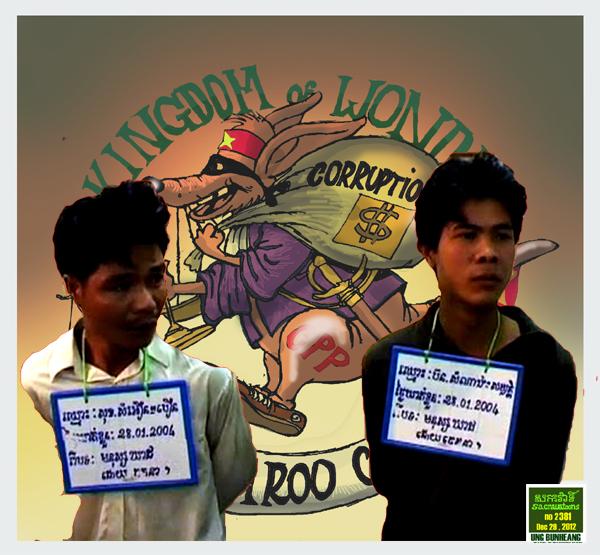
A
man (right), one of six people accused of intentional violence and
damage to public property during clashes last year on the Kbal Thnal
overpass, leaves Phnom Penh Municipal Court yesterday. PHOTO SUPPLIED
Can’t place the face
None of more than 30 police officers serving as witnesses for
the prosecution yesterday could identify any of the six men on trial for
violence and property damage they allegedly committed at Phnom Penh’s
Kbal Thnal overpass on September 15 last year, when police bullets
killed one and injured dozens.
When asked whether national or municipal police made the arrests,
each witness – all members of the national and municipal police
departments, the only police departments at the scene – testified they
did not know which department made the arrest, but that their department
did not.
“I’ve never heard of that before,” Moeun Tola of the Community Legal
Education Center (CLEC), which has provided two attorneys for the
defendants’ defence, said of the stated confusion over basic facts in a
trial. “But anything can happen in Cambodia.”

(Image: Sacrava, Kangaroo Court)
The six men – Nguyen Thydoc, Ek Channoeun, Tang Chunse, Song Nisay,
Long Samoeun and Van Nin – each face prison terms ranging from two to
five years and fines of up to 10 million riel ($2,500) if found guilty
of intentional violence and damage to public property.
The charges stem from a bloody clash of authorities and a mixture of
protesters and commuters at a roadblock on the overpass the first night
of a three-day mass protest held by the Cambodia National Rescue Party.
Police allege that riotous demonstrators there threw rocks and fired
slingshots at authorities.
Before they opened fire with automatic weapons into the crowd,
killing 29-year-old Mao Sok Chan, police were seen beating people with
electric batons and kicking already-restrained men in the head.
Thydoc said in court yesterday that he threw no projectiles and that
his confession of throwing rocks was coerced by police who shocked him
with electric batons until he admitted to the crime. His bail request
was subsequently denied.
“I would like to retract all answers I gave during my interrogation,”
Thydoc, the only of the six defendants still held in pre-trial
detention, said. “I was electrified and beaten with electric batons many
times, and I could not bear it, so I confessed so they would stop.
On the stand, brothers Samoeun and Nin each testified that they had
rushed to the overpass after a relative told them their other brother
had been injured in a motorbike accident not related to the clash.
They reached the bridge as the clash was occurring and asked police
there for permission to walk across so they could look for their
sibling, both brothers said. Police told them they could, if they kept
their hands on their heads when crossing, but other authorities arrested
them as they walked with their fingers interlocked atop their heads.
“I followed police orders, but when we walked a little bit, we were followed by other police, who arrested us,” Samoeun said.
Describing the scene on the overpass that September night, Kuch
Sopheap, a deputy chief in the Ministry of Interior’s Intervention
Police Department, said he and about 20 riot police under his command
withstood rocks and other projectiles hurled by about 200 rioters.
However, Sopheap said, he could not identify whether any of the six
defendants were among those who threw rocks at them. “I cannot conclude
whether these six threw rocks at us,” Sopheap said. “Our group did not
arrest them.”
Speaking after yesterday’s trial, Naly Pilorge, director of rights
group Licadho – which provided two defence attorneys to defendants –
said investigators and court officials should have noted a lack of
evidence against the six men long ago.
Furthermore, Pilorge said, the focus of any prosecution related to
the incident should be on law enforcement officers, who allegedly killed
and injured civilians. “If the case were truly an independent court …
these people should not have spent one day in prison,” Pilorge said.
“The government continuously fails to come up with any kind of credible investigation of its own armed forces.”
National Police spokesman Kheng Tito last night did not immediately
reply to a text message from a Post<?i> reporter inquiring about
the status of an internal investigation into the shooting.


No comments:
Post a Comment